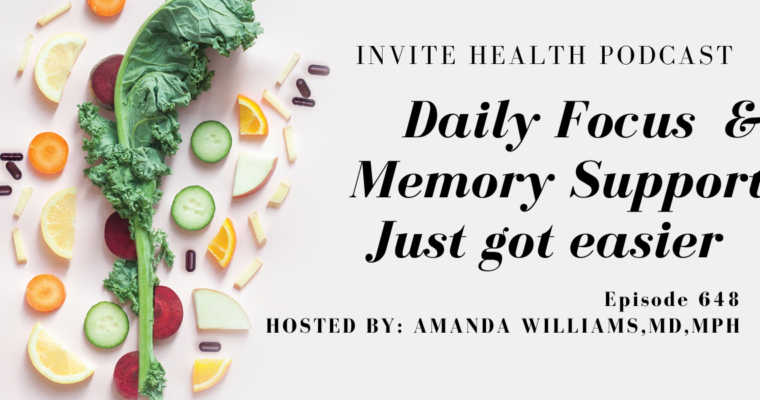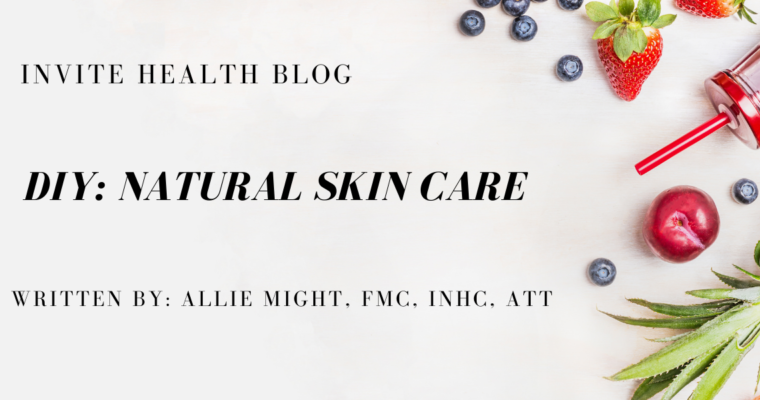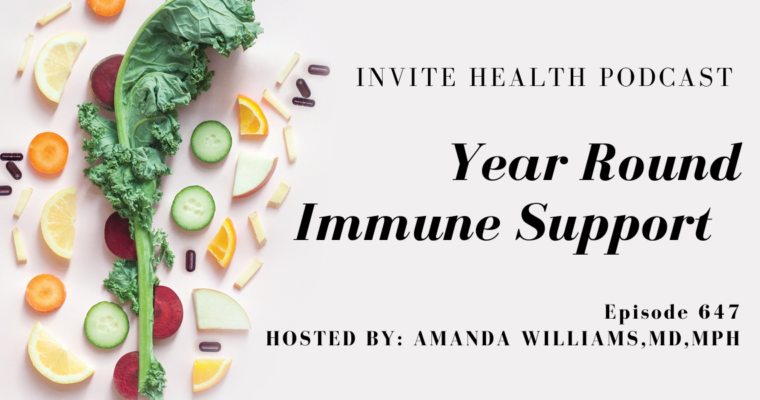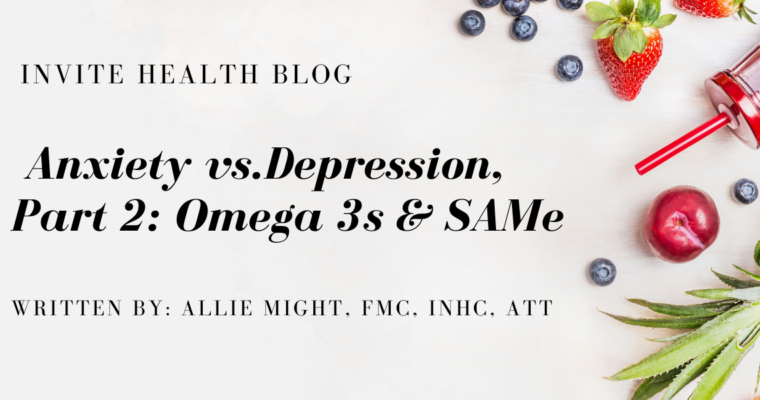Subscribe Today!
Please see below for a complete transcript of this episode.
CIRCULATION SOLUTIONS & TIPS FOR HEALTHY VESSELS, INVITE HEALTH PODCAST, EPISODE 646
Hosted by Amanda Williams, MD, MPH

*Intro Music*
InViteⓇ Health Podcast Intro: [00:00:04] Welcome to the InViteⓇ Health Podcast, where our degreed health care professionals are excited to offer you the most important health and wellness information you need to make informed choices about your health. You can learn more about the products discussed in each of these episodes and all that Invite Health has to offer at, invitehealth.com/podcast. First time customers can use promo code podcast at checkout for an additional 15% off your first purchase. Let’s get started. † [00:00:34]
*Intro Music*
Amanda Williams MD, MPH: [00:00:41] Having good circulation is key to aging gracefully. We know that there are many things that can disrupt our healthy circulatory system and create problems for us. Not just having problems such as blood pressure regulation. But when you look at the effects that this can have on cerebral circulation. So, the blood that travels to the brain as well as looking at particular conditions that are quite prevalent especially here in the United States. I’m Dr. Amanda Williams, scientific director at Invite Health. And today I want to talk about those factors because I have many individuals who come to me who complain about aching legs, maybe your legs feel heavy, maybe when you’re walking, you feel like the legs themselves get tired out very fast. Or you feel like there’s muscle cramping that occurs. This may be something that’s more problematic than you actually realize. We know that conditions such as chronic venous insufficiency, as well as peripheral artery disease, are very prevalent here in the United States. When you look at the statistics on both of these conditions, it is actually quite high, the number of people who are dealing with these different problems, peripheral artery disease, we recognize, affects close to 20% of the U.S. population. Now, this usually goes hand in hand with coronary artery disease and cerebrovascular issues as well. So, once we have one area of circulation that is giving us a problem, this is going to affect all areas, which is why when people have high blood pressure, for example, it starts to affect kidney health and the circulation that feeds into the kidneys, which is why blood pressure regulation is so critical. We can also look at problems which we refer to as intermittent claudication and having claudication, this is when you have those pains in the legs as you are walking or any type of movement in general brings about excessive pain. Some people can actually recognize this in the form of swelling. This is more geared towards chronic venous insufficiency. When you get a lot of the swelling and the edema that’s associated with this. Chronic venous insufficiency is a little bit different than peripheral artery disease; one is. dealing with arteries, the other is dealing with veins. But the both of them, at the end of the day, it comes down to lack of proper circulation, usually brought on because of ejection fraction decreasing. So, the way that the heart itself is pumping and forcing the blood and the oxygen out to the tissues. So, when we look at conditions such as chronic venous insufficiency, as well as peripheral artery disease. We always have to go to the primary source, which is going to be the heart itself. † [00:03:35]
[00:03:38] The reason I bring this up is because, as I mentioned, many individuals come to me and say that they experience these types of problems, chronic venous insufficiency. It is also a very prevalent issue and condition in this country. And we have to recognize that common treatments that most people will seek out from their primary doctor oftentimes doesn’t lead to too much symptomatic relief. It certainly puts you at a greater risk of having a potential side effect to the medications that they are prescribing. But we do want to always say, well, what’s the underlying root cause and how do we make improvements on this? As I mentioned, intermittent claudication, this is usually the most common reason as to why people present to their doctor’s office. When you have what appears to be muscle pain when you’re active. And then you sit down and then it starts to resolve itself. This is known as the intermittent claudication. This is commonly associated, as I mentioned, with peripheral artery disease. Now, when you have the pooling of blood and fluids in the lower extremities down near the ankle, this is going to be more associated with chronic venous insufficiencies. So, we’re getting kind of a pooling out or a leakage out of the vascular system, and we get that fluid that’s building up. In either case as I mentioned, we’re dealing with a breakdown of the integrity of the lining of those vessels or arteries. And we’re also having to always draw this back to why is it that the heart itself is struggling to get proper flow out to those extremities? So, when you’re dealing with this, we always want to make sure if you have high blood pressure, that the blood pressure itself is well regulated. You want to make sure that you were doing the right things in terms of your dietary intake of good, healthy antioxidants. Having foods that are high in omega threes to help lower inflammation around those vessels and arteries, this will certainly help. And then we can look at different nutrients. † [00:05:50]
POWER UP YOUR HEART WITH GRAPE SEED EXTRACT, INVITE HEALTH PODCAST, EPISODE 641>>LISTEN NOW!
[00:05:51] We have many different varieties of products that are available that have been shown in clinical research trials to be incredibly beneficial when it comes to enhancing circulatory function. We can look at the Veins Hx formulation just as being one of those products that we offer, and we have such success with this particular formulation. And this is a herbal blended formulation. So, it has different nutrients in it that have been clinically studied and shown to be very effective in the repair mechanism of the vascular system. So, it has horse chestnut extract, there is citrus bile flavonoids in this, Vitamin C, because we know that’s very important for the collagen that lines those vessels. It has gotu kola extract, there’s horsetail extract along with Bilberry Extract. So, the powerful anthocyanins that come along with those fruit extracts are all contained in the Veins Hx. So, it really helps to support proper blood flow and overall circulatory function. I have found great success utilizing this product in folks who are dealing with chronic venous insufficiency, folks who are dealing with hemorrhoids. Even if you have an acute injury, say, for example you sprain your ankle, this is a really great way to help that healing process along and we can look at the scientific research on how it is that horse chestnut, for example, has been studied in the setting of chronic venous insufficiency. Over ten years ago they published a really interesting find on a meta-analysis of looking at multiple clinical research trials that showed the efficacy as well as the safety, most importantly, the safety, because we know that the prescribed medications come with side effects. † [00:07:49]
[00:07:50] So we always want to look at if we’re using these different herbal extracts. Number one, is it going to work? Number two, is it safe? And yes, this is what this study zeroed in on, is looking at these randomized controlled trials and showing the effectiveness of horse chestnut as well as the safety of the use of horse chestnut when it comes to chronic venous insufficiency with improvement not only on the circulatory function itself, but with leg pain that is associated with chronic venous insufficiency and clearly with peripheral artery disease. That’s where that intermittent claudication comes back into play. So, for folks who are dealing with either one of those conditions, whether it be chronic venous insufficiency, or peripheral artery disease, The Veins Hx is an excellent choice because we know just through all of the clinical research done on this, that the overall improvement is quite astonishing, and that horse chestnut is considered to be a highly effective way for the treatment of chronic venous insufficiency. We can see how it’s been studied in other countries and actually utilized in other countries as a treatment modality for these different circulatory conditions. So that’s one example of a formulation that can definitely be turned to for those who are dealing with any type of circulatory problem. We can look right at those proanthocyanins coming from grape seed extract, coming from resveratrol, so if circulatory issues are a concern for you, this would always be advantageous to add in something like the Resveratrol Hx or the Resveratrol Max, which is going to not only give you the trans-resveratrol. But also, the grape seed extract in both of those formulations. You can do grape seed extract just by itself, this is another option that you can certainly do. Looking at other reasons why someone may be dealing with these circulatory issues, we can always go back to, ‘Are we getting enough magnesium?’ We know that magnesium is so important for the way in which our blood vessels can relax, and we have to have good relaxation of those vessels in order to have adequate blood flow and oxygenation through those vessels and arteries. So hence, if we are not supplementing with magnesium on a daily basis and we know that our diets are oftentimes incredibly lacking in adequate magnesium exposure. It would be highly advisable to make sure that you are including in magnesium to your daily supplementation routine. † [00:10:40]
ICYMI: KEEPING THE BRAIN CLEAN WITH RESVERATROL, INVITE HEALTH PODCAST, EPISODE 645>>LISTEN NOW!
[00:10:41] We have another formulation called Circusupport. This is another flavonoid, herbal supplement blend that really zeroes in once again on supporting the integrity of the vascular system. And this is a wonderful blend of Butcher’s Broom extract, has dioscimin extract, there’s hesperidin in this. All of which have been studied in the setting of chronic venous insufficiency in the setting of peripheral artery disease. Dioscimin in particular has been studied quite extensively when it comes to varicose veins and spider veins. So, we can look at formulations such as Circusupport, we can look at the formulation such as the Veins Hx, and recognize that these different products would be incredibly beneficial for those who are really looking to step up their circulatory support game. Now, when it comes to which product would be most supportive to your specific needs, this is one you would want to speak with one of our nutritionists and zero in on your particular issues. You know, are you finding that you have a lot of those muscle aches? Are you finding that you end up with swelling in the lower legs at the end of the day? Do you wake up in the middle of the night because you have muscle cramps? You know, these are the things that we need to know because it may modify what we advise you to take and when to take those nutrients. And keep in mind, too, something like restless leg syndrome, we always have to look at underlying issue with low iron status in the body. So, it may be advantageous to even include in the iron plus formulation to address those concerns. But when it comes to our circulation this is something that we definitely don’t want to overlook. We want to make sure that we maintain good cardiac as well as cerebral circulation, because we want to be able to age gracefully. And believe it or not, the way that your blood is moving about your body is incredibly important to that. And to have success with that, we want to make sure that we have those right nutrients on board. There are certainly many more formulations within our product line that can zero in on this. But it was a topic that I wanted to discuss because it’s been something that’s come up quite often in the past couple of weeks where I’ve had people ask me about this. So, I thought I would zero in on the Veins Hx, the Circusupport as well as that grape seed extract. So, I want to thank you so much for tuning in to the InViteⓇ Health Podcast. Remember, you can find all of our episodes for free wherever you listen to podcasts or by visiting, invitehealth.com/ podcast. Do make sure that you subscribe, you leave us a review. You can follow us on Facebook, Twitter, and Instagram at Invite Health and we will see you next time for another episode of the InViteⓇ Health Podcast. † [00:10:41]
*Exit Music*











